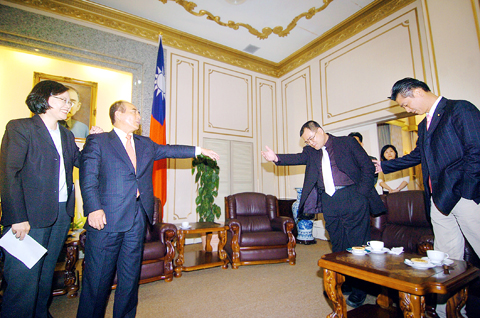Chinese Nationalist Party (KMT) Legislative Speaker Wang Jin-pyng (王金平) and Democratic Progressive Party (DPP) Chairwoman Tsai Ing-wen’s (蔡英文) efforts to resolve a conflict between KMT Legislator Hung Hsiu-chu (洪秀柱) and DPP Legislator Kuan Bi-ling (管碧玲) seemingly failed yesterday when Kuan failed to show up and apologize to Hung as arranged.
Kuan slapped Hung across the face on Wednesday after Hung had poked Kuan’s assistant in the eye when pushing away a poster during the Education and Culture Committee’s preliminary review of the budget for the National Science Council.
“We arranged this meeting to resolve yesterday’s [Wednesday’s] conflict. Therefore, I informed Legislator Hung about it, but Legislator Kuan still did not show up,” Wang said at his office after he and Tsai had waited for the two lawmakers to make peace.

PHOTO: FANG PIN-CHAO, TAIPEI TIMES
“We have failed to achieve what the meeting was meant to achieve,” he said.
Tsai, who was also to have attended the meeting, told Wang that she had called Hung and Kuan yesterday morning and “could feel both sides’ sincerity in resolving the matter.”
Tsai also urged Wang to help negotiate and amend legislative regulations on the threshold required to initiate proposals in legislative committees.
Wednesday’s altercation took place when three DPP legislators were boycotting the preliminary review. They wanted to propose the NSC’s budget request be cut, but their initiative was unable to make it onto the committee’s agenda because they needed the support of one more legislator. The DPP only occupies three seats on the committee.
However, Wang said negotiating the threshold would not be possible unless the conflict between Hung and Kuan was resolved.
By slapping Hung in the face Kuan had harmed the image of the Legislative Yuan, Wang said.
When asked for comment later yesterday, Kuan said she would not apologize to Hung unless Hung apologized to Kuan’s assistant first.

The Ministry of Education (MOE) is to launch a new program to encourage international students to stay in Taiwan and explore job opportunities here after graduation, Deputy Minister of Education Yeh Ping-cheng (葉丙成) said on Friday. The government would provide full scholarships for international students to further their studies for two years in Taiwan, so those who want to pursue a master’s degree can consider applying for the program, he said. The fields included are science, technology, engineering, mathematics, semiconductors and finance, Yeh added. The program, called “Intense 2+2,” would also assist international students who completed the two years of further studies in

The brilliant blue waters, thick foliage and bucolic atmosphere on this seemingly idyllic archipelago deep in the Pacific Ocean belie the key role it now plays in a titanic geopolitical struggle. Palau is again on the front line as China, and the US and its allies prepare their forces in an intensifying contest for control over the Asia-Pacific region. The democratic nation of just 17,000 people hosts US-controlled airstrips and soon-to-be-completed radar installations that the US military describes as “critical” to monitoring vast swathes of water and airspace. It is also a key piece of the second island chain, a string of

Former president Tsai Ing-wen (蔡英文) departed for Europe on Friday night, with planned stops in Lithuania and Denmark. Tsai arrived at Taiwan Taoyuan International Airport on Friday night, but did not speak to reporters before departing. Tsai wrote on social media later that the purpose of the trip was to reaffirm the commitment of Taiwanese to working with democratic allies to promote regional security and stability, upholding freedom and democracy, and defending their homeland. She also expressed hope that through joint efforts, Taiwan and Europe would continue to be partners building up economic resilience on the global stage. The former president was to first

Taiwan will now have four additional national holidays after the Legislative Yuan passed an amendment today, which also made Labor Day a national holiday for all sectors. The Chinese Nationalist Party (KMT) and Taiwan People’s Party (TPP) used their majority in the Legislative Yuan to pass the amendment to the Act on Implementing Memorial Days and State Holidays (紀念日及節日實施辦法), which the parties jointly proposed, in its third and final reading today. The legislature passed the bill to amend the act, which is currently enforced administratively, raising it to the legal level. The new legislation recognizes Confucius’ birthday on Sept. 28, the